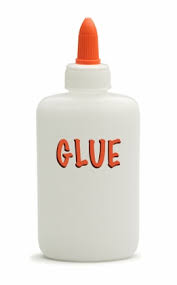记忆方法
将“glue”联想为一个“glue”动作,想象一滴胶水从瓶中滴出,紧密地粘合两个东西,这样就可以记住“glue”表示胶水,粘合的意思。
以上内容由AI生成, 仅供参考和借鉴
中文词源
glue 胶水
来自PIE*glei, 黏,粘,词源同clay, cling.
英语词源
- glue
-
glue: [14] Glue is an ancient word, whose ancestry can be traced back all the way to Indo- European *gloi-, *glei-, *gli- ‘stick’. Its Latin descendant was glūten, from which English gets gluten [16], glutinous [16], and agglutinate [16]. In post-classical times this spawned a new form, glūs, which English acquired via Old French glu as glue.
=> agglutinate, gluten, glutinous - glue (n.)
- "viscous adhesive substance," early 13c., from Old French glu "glue, birdlime" (12c.), from Vulgar Latin *glutis or Late Latin glutem (nominative glus) "glue," from Latin gluten "glue, beeswax," from PIE *gleit- "to glue, paste" (cognates: Lithuanian glitus "sticky," glitas "mucus;" Old English cliða "plaster"), from root *glei- "to stick together" (see clay). Formerly also glew. In reference to glue from boiled animal hoofs and hides, c. 1400. Glue-sniffing attested from 1963.
- glue (v.)
- "join or fasten with glue," late 14c., from Old French gluer, gluier "smear with glue; join together," from glu "glue, birdlime" (see glue (n.)). Related: Glued; gluing.
权威例句
- 1. Stick them on using a small amount of glue.
- 用少许胶水把它们贴上。
- 2. The smell of sawdust and glue pervaded the factory.
- 工厂里弥漫着锯屑和胶水的气味。
- 3. Glue the mirror in with a strong adhesive.
- 用强力胶将镜子固定到位。
- 4. Secure with a few spots of glue.
- 用几滴胶水粘住。
- 5. He felt light-headed, as if he'd sniffed glue.
- 他觉得晕乎乎的,好像吸了胶毒一样。

